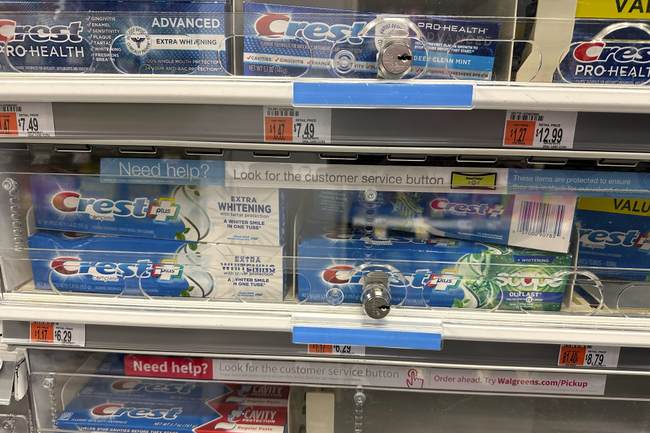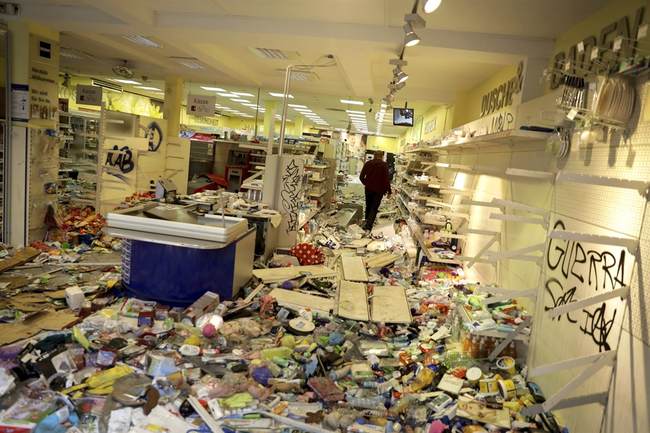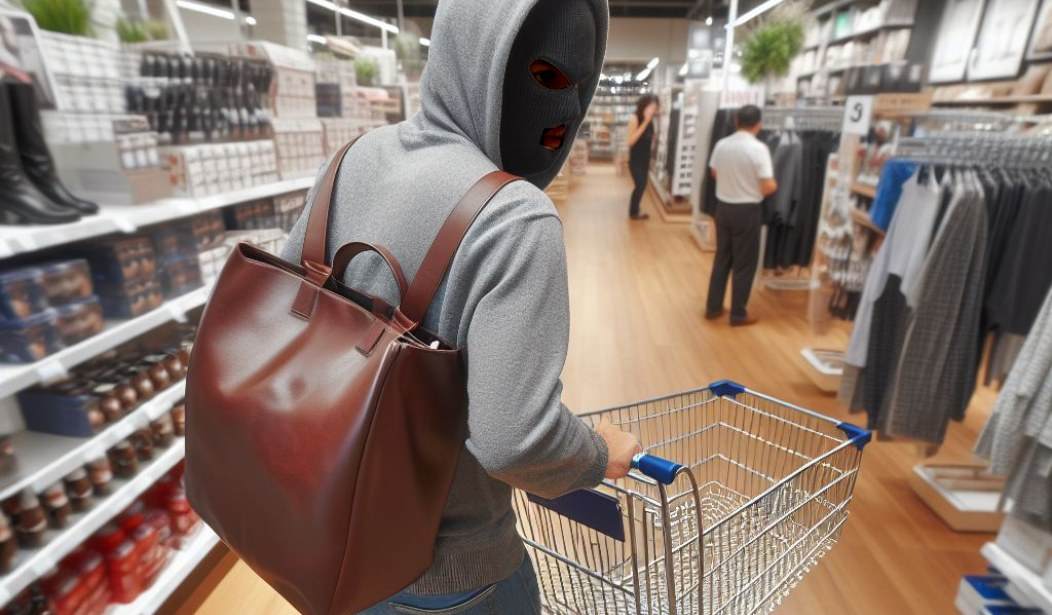The media has relied on the phrase "Republicans pounce" for so many years that it's become an eye-rolling punchline these days. The journalism trope used to defend Biden and Democrats has become so overplayed there is by now a litany of Republican verbs that fall under this “Pouncing” umbrella – seize/leap/jump/highlight/latch/grasp/promote/leverage/push, along with numerous others. You realize this deflection method is failing when a story has legs and those nefarious conservatives are having an effect, and then the next stage is quickly rolled out by journalists: Republicans are "weaponizing" an issue.
One of the topics where this gets used frequently is in regards to crime in this country, moreover the rise of such in blue cities with permissive district attorneys involving their revolving door wave-bail-and-release practices. Specifically, shoplifting and store closures often have been a focus, and the need to deflect from this reality has been persistent. It may have reached a nadir this weekend in the Washington Post.
In a lengthy dose of deflection by Maura Judkis that came out on Friday, the effort is made to paint the entirety of conservative America noticing the crime problem as one big “pouncing” hysteria that should be brushed off with the wave of a hand. While I do not set off to intentionally target Ms. Judkis and rake her over the coals (though I will be doing that), what needs to take place is a full autopsy on this dead-on-arrival commentary, as it contains so many - and possibly all - of the vacant arguments seen from the press.
To start, she says a lone CVS drug store in Washington D.C. has been unfairly held up as proof of a national shoplifting problem by conservatives. You see it in the text still attached to the web address: “The Legend of the Empty CVS In Washington D.C.” This former headline alone underscores the subterfuge. For one, it is not a “legend,” it is very real, as she goes on to describe. She also tries to position this store as a lone outlier, displayed as emblematic of a non-existent problem.
First, the background. The CVS location is in Columbia Heights and has been the target of repeated shoplifting incidents, both by individuals and coordinated attacks by crowds. As a result, the store has locked up some items behind plexiglass while rows of empty shelves stand unstocked. The company has announced it will be closing the location at the end of this month. This has made news and been pointed out on social media, and Maura is really bothered that people have noticed this taking place.
It became a horror story of Late Capitalism. Tales were told on social media, and in the comments sections of local news stories.
But the thing about scary stories is that they metastasize with each retelling. The empty CVS had somehow become a stand-in for all that is wrong with American cities — and liberals (and liberal democracy?) — in 2024.
Thus begins the recasting of what is taking place. Ms. Judkis needs to pretend we have not seen this very scene playing out in numerous cities involving a variety of retail chains. Stores with lockbox displays and using gates to barricade stock, along with aisles made accessible only to employees have been recorded across the country. And Maura’s blithe attempt to cast this problem onto capitalism is also foolish. The cost of these measures is a drain, and the incarcerated inventory depresses sales by shoppers, as it impedes purchases and stifles impulse buying.
Next, she tries desperately to minimize the national theft problem. First, she blames this on the national practice of thievery, saying the country was “built on stolen land.” Then she laughably declares the larceny taking place to be nothing more than “petty theft”, but disqualifies her own claim by noting “Videos of brazen thefts” that have been seen across social media. Want proof of this farcical claim? The expense incurred by stores to secure items is not petty, therefore the shoplifting taking place has to exceed the level of "petty."

She then resorts to a pathetic tactic often seen in the press to dissuade us from reaching an obvious conclusion based on visible and researchable evidence. This section can be summed up with a paraphrase - “Is there a shoplifting problem? Well, it’s complicated.” She wants to make things less clear and import supposedly disqualifying evidence, or claim a lack of evidence to support the narrative.
Except - she manages to provide the very evidence she says is in short supply. Speaking with a public safety commissioner, she inadvertently highlights some of the factors contributing to the retail theft she attempts to say is not happening. She tries to excuse the thievery with explanations of the economic hardships felt by many, such as joblessness, inflation, and/or slow recovery from the pandemic (in defiance of the press telling us we have a roaring economy), and we then learn of another factor.
There have also been changes to how police officers do their jobs — “a dearth in active policing,” as Carlo Perri puts it, that started in the pandemic, combined with efforts to use alternative forms of crime deterrent. “But none of those alternatives really were implemented effectively, or as effectively as they could have been.”
This, obviously, references the Defund The Police movement, and the call to install community enforcement divisions taking on the role of public safety. That was another of the topics on which conservatives pounced or weaponized. Another term could be applied here: “Proven correct."

Judkis continues with her expert, and she seems oblivious to his comments proving her wildly incorrect.
Meanwhile, in Washington, city officials say they’ve observed a rise in organized retail crime, which involves thefts of items to be resold on the street. “If shoplifting is easy and available to you, with low accountability, then, you know, it just is a practical choice,” Perri says.
By this point, I am simply mystified. How does a journalist make claims of mythical accusations of robberies being a problem, positioning conservatives as manufacturing a fake narrative, and then turn to a community authority who declares this is in fact taking place?! You almost have the sense that she was not even listening to what was spoken and just used voice-to-text software to transcribe this segment.
And it gets better. Judkis provides a quote from D.C. Mayor Muriel Bowser, herself someone whose name has been associated with a permissive stance towards crime. The mayor was asked about the store closing and the factors behind it.
“We have to stop treating it … like kids just shoplifting a thing or two, because it’s having real impact on the ability for people to get the goods and services that they need,” said Bowser. “So the law has to be right. The police have to be able to do their jobs. And the prosecutors have to do their jobs. We do have to send the message in our city that stealing anything, anywhere, has consequences.”
Those comments are in direct opposition to the positions taken throughout this article. So this is where we are at by this point: the store is closing due to theft, a community leader asserts it is due to theft, and the mayor has pointed to the problem of theft in the community leading to this result – but conservatives are way out of line for suggesting theft is the cause, as has been seen across the country. This is a remarkable example of journalism, and I do not mean that in a complimentary fashion.
I will close this with a thought:
- It doesn’t help that 2024 in America feels a bit like visiting a dying mall.
For the record, that was not a case of me being melodramatic. That quote was supplied by Maura Judkis herself, in her piece declaring that conservatives making the exact same suggestion are the ones who are out of line and misrepresenting the facts. Facts, for the record, that Judkis supplied in the same article.














Join the conversation as a VIP Member